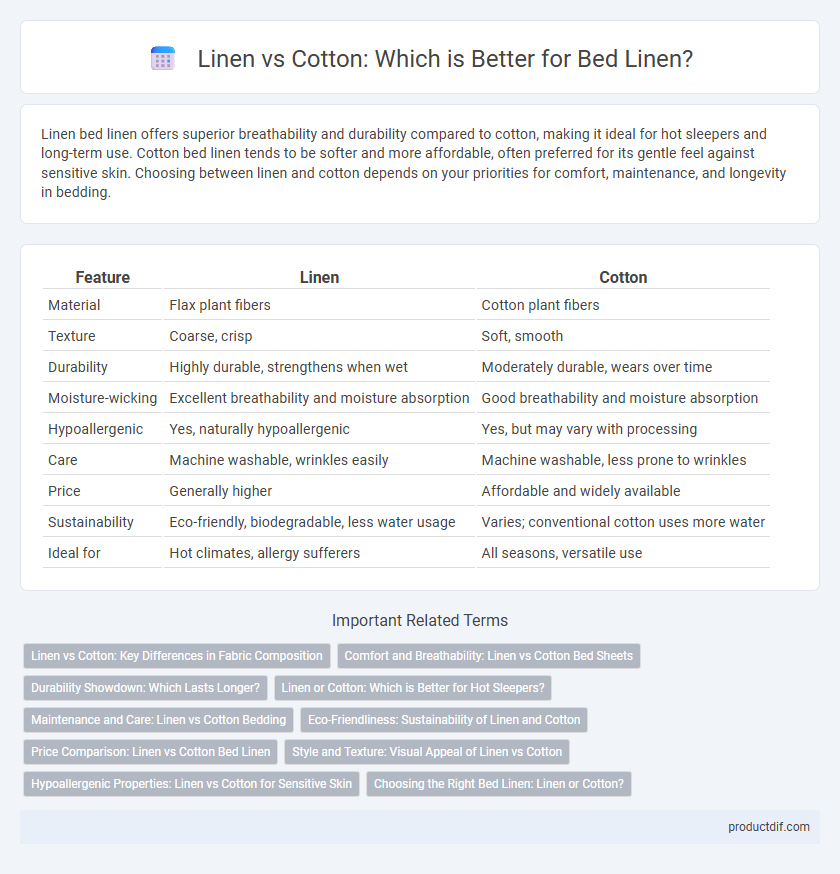Linen bed linen offers superior breathability and durability compared to cotton, making it ideal for hot sleepers and long-term use. Cotton bed linen tends to be softer and more affordable, often preferred for its gentle feel against sensitive skin. Choosing between linen and cotton depends on your priorities for comfort, maintenance, and longevity in bedding.
Table of Comparison
| Feature | Linen | Cotton |
|---|---|---|
| Material | Flax plant fibers | Cotton plant fibers |
| Texture | Coarse, crisp | Soft, smooth |
| Durability | Highly durable, strengthens when wet | Moderately durable, wears over time |
| Moisture-wicking | Excellent breathability and moisture absorption | Good breathability and moisture absorption |
| Hypoallergenic | Yes, naturally hypoallergenic | Yes, but may vary with processing |
| Care | Machine washable, wrinkles easily | Machine washable, less prone to wrinkles |
| Price | Generally higher | Affordable and widely available |
| Sustainability | Eco-friendly, biodegradable, less water usage | Varies; conventional cotton uses more water |
| Ideal for | Hot climates, allergy sufferers | All seasons, versatile use |
Linen vs Cotton: Key Differences in Fabric Composition
Linen is made from flax fibers, offering a coarser texture and higher durability compared to cotton, which is derived from soft cotton fibers known for their smoothness and breathability. Linen absorbs moisture more efficiently and dries faster, making it ideal for warm climates, while cotton excels in softness and is easier to care for due to its wrinkle resistance. The natural fiber composition of linen results in a fabric that becomes softer with use, whereas cotton maintains consistent softness but may wear out more quickly over time.
Comfort and Breathability: Linen vs Cotton Bed Sheets
Linen bed sheets provide superior breathability due to their natural fiber structure, allowing better air circulation and moisture-wicking properties compared to cotton. Cotton sheets offer a softer, smoother texture with good comfort but can retain more heat and moisture, which may affect sleep quality. For those prioritizing coolness and durability, linen is often the preferred choice, while cotton remains popular for its softness and affordability.
Durability Showdown: Which Lasts Longer?
Linen bed linen outperforms cotton in durability due to its strong flax fibers, which resist wear and tear over time. Cotton, while soft and breathable, tends to deteriorate faster with frequent washing and use. Investing in linen sheets ensures longer-lasting bedding that maintains quality through years of regular maintenance.
Linen or Cotton: Which is Better for Hot Sleepers?
Linen bed linen excels for hot sleepers due to its natural breathability and moisture-wicking properties, keeping the body cool and dry throughout the night. Cotton also offers softness and breathability but tends to retain more heat and moisture compared to linen. Choosing linen sheets enhances airflow and temperature regulation, making them a superior option for those prone to night sweating or overheating.
Maintenance and Care: Linen vs Cotton Bedding
Linen bedding requires gentle washing with mild detergents and benefits from air drying to maintain its durability and natural texture, while cotton bedding is more versatile, tolerating higher temperatures and frequent washing without losing softness. Linen fibers become softer with age but need prompt removal from the dryer to prevent excessive wrinkles, whereas cotton is easier to iron and resists pilling. Proper maintenance extends linen's lifespan significantly, and cotton's resilience to wear makes it ideal for daily use.
Eco-Friendliness: Sustainability of Linen and Cotton
Linen, made from flax fibers, is highly sustainable due to its low water usage, minimal pesticide requirements, and biodegradability, making it an eco-friendly choice for bed linen. Cotton, while widely used, typically demands more water and chemical inputs during cultivation, especially conventional varieties, which affects its environmental footprint. Organic cotton offers improvements in sustainability but generally still requires more resources compared to linen's naturally eco-friendly cultivation process.
Price Comparison: Linen vs Cotton Bed Linen
Linen bed linen typically costs more than cotton due to its labor-intensive production and durability. Cotton bed linen offers a more budget-friendly option with widespread availability and softer textures. Pricing for linen can be 30-50% higher, reflecting its premium status and longer lifespan compared to conventional cotton bedding.
Style and Texture: Visual Appeal of Linen vs Cotton
Linen bed linen offers a natural, slightly textured surface with a matte finish that enhances rustic and elegant bedroom styles, creating a relaxed yet sophisticated aesthetic. Cotton bed linen features a smoother, softer texture with a subtle sheen, providing a crisp, polished appearance ideal for classic and modern interiors. The visible weave of linen adds a tactile dimension and depth to the bed's visual appeal, while cotton's uniform finish emphasizes comfort and a clean look.
Hypoallergenic Properties: Linen vs Cotton for Sensitive Skin
Linen is naturally hypoallergenic and moisture-wicking, making it ideal for sensitive skin as it resists bacteria and allergens better than cotton. Cotton, while soft and breathable, can retain moisture and harbor dust mites, potentially causing irritation for allergy sufferers. Choosing linen bed linen helps reduce skin irritation and promotes healthier sleep for individuals with sensitive or allergy-prone skin.
Choosing the Right Bed Linen: Linen or Cotton?
Linen bed linen offers exceptional breathability and durability, making it ideal for hot climates and long-term use. Cotton, available in various weaves like percale and sateen, provides a softer feel and easier maintenance, suited for those prioritizing comfort and low upkeep. Choosing the right bed linen depends on factors such as desired texture, climate, and care preferences, ensuring optimal sleep quality and fabric longevity.
Linen vs Cotton Infographic

 productdif.com
productdif.com